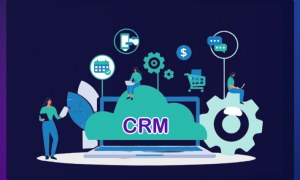Customers are the driving force of every business, from startups to large enterprises. It is a universal fact, and there is no denying it. Hence, businesses are obliged to fulfill their customers’ needs impeccably. Thanks to today’s technology, they have access to the best CRM software (Customer Relationship Management) in the market.
However, most companies find it overwhelming to choose the right CRM software since many options are available. Quite precisely, the current market is packed with feature-rich CRM products. As a result, the process of picking the right CRM platform is now crowning the ‘never-ending to-do’ list of companies.
But let’s knock out this task now! How? Our blog will peek inside the top 10 CRM software and help you understand how they work. Besides, we will show you how each CRM platform is unique from others. So, at the end of the blog, you get a better understanding of which CRM suits your firm.
So, we can start now!
What do you mean by CRM software?
CRM, or Customer Relationship Management, is a platform that stores customers’ info to optimize a company’s sales performance and workflow management. Besides, it is a cohesive system that not only helps businesses manage conversations with customers but enables seamless coordination across teams and departments.
So, today, when we look around, almost all types of companies integrate the best CRM software, seeing it as a strategic asset to grow in their niche. But what makes the CRM software stand out? How do these software products help the business? Well, to give a simple answer, CRM has advanced features.
Here, the first-class CRM software ensures robust features like reporting, automation, sales management, etc. In simpler terms, a CRM platform replaces the multitude of paperwork, spreadsheets, and databases to assist companies in impressing customers and enhancing time management.
Let’s learn: How To Create A Custom CRM Solution
As a result, we can say that the best CRM software is a hub that connects different departments in a firm, offering a consistent work environment. Nevertheless, in addition to its core features, CRM offers appealing benefits. We are going to explore that in the following portion.
Why are CRM platforms essential for businesses?
CRM software has a proven track record of helping businesses increase leads and sales revenue. The data from Statista indeed approves this point. It shows that the global CRM market will expand further to USD 57 billion in revenue in 2025. That means we can expect a CAGR of 2.1% between the years 2021 and 2025.
So, let’s check out the key benefits of the CRM platform:
- Offers a centralized database with information
One of the key advantages of a candidate management system is that it provides a centralized platform to store customer information. Moreover, it is easily accessible to all authorized users. That means the users do not have to spend time digging old records from different software products.
- Enhance the business-customer relationship
The best CRM software will never deviate from its core purpose of providing better customer service. Therefore, it stores the customer’s contact details and collects all necessary information, including demographics and purchase history. As a result, companies using CRM can access customer info at their fingertip and provide better customer experiences.
- Boost sales performance and productivity
With its sales pipeline management, CRM helps companies streamline their sales process by automating tasks and analyzing data in one centralized system. As a result, a CRM platform not only boosts the company’s productivity but also increases sales revenue in less time.
- Facilitate smooth internal communication
Similar to how CRM streamlines the communication between a company and customers, it also allows unparalleled coordination of employees from different departments. As an outcome, the company can maintain a unified brand voice with the help of the best CRM software.
Know more: What Can a CRM Provider Accomplish for Your Worldwide Business?
Which are the top 10 CRM software suitable for firms?
Here is the list of top 10 CRM services that meet your specific business needs:
1. Salesforce
Known for its highly built analytics and reporting feature, Salesforce has taken a share of 24% in the CRM global market. Besides, most companies choose this platform since it provides endless possibilities for customization. Furthermore, it’s widely suitable for mid-sized and large businesses.
Features of Salesforce:
- Supports candidate management system.
- Provides real-time reports and dashboard.
2. SAP CRM
SAP CRM gives a 360-degree view of customer interactions and internal communication, helping businesses to resolve issues quickly. Most importantly, SAP CRM offers monthly and annual subscriptions to access its features. However, the users can purchase its products at a price upon request.
Features of SAP CRM:
- Safely store customers’ information in a central system.
- Track customer communication to deliver a consistent experience.
3. ServiceNow
Though ServiceNow is an IT service management (ITSM) platform, it has some customer relationship capabilities, making it the best CRM software. As a result, it provides a rich set of features for users. These features digitize and unify companies to work smarter and faster for a smooth workflow.
Features of ServiceNow:
- Track and solve user issues quickly.
- Ensure strong security measures to protect consumer data.
4. Zoho CRM
Zoho CRM is the best CRM software for sales management solutions. Besides, this platform is highly customizable, where the users can personalize the interface’s look and style according to their brand’s needs.
Features of Zoho CRM:
- Automate and customize the workflow for high productivity.
- Coordinate teams and business apps to give a seamless brand experience.
5. HubSpot
Compared to other CRM platforms, HubSpot CRM is the best CRM to scale up one’s business. Why? Because it is easy to use. Moreover, it provides free-tier plans, offering businesses a range of features to help with marketing and sales efforts.
Features of HubSpot:
- Enhance customer engagement and increase sales.
- Gives insights into building suitable marketing campaigns.
6. Microsoft Dynamics
Microsoft Dynamics is an operational CRM that offers a line of business software applications. From marketing to finance, one using this platform can cover all the aspects of business under one roof.
Features of Microsoft Dynamics:
- Track and handle customer information.
- Streamline and automate sales processes.
7. Pipedrive
As a sales pipeline management tool, Pipeline tracks the progress of sales throughout its cycle. Also, it is best used by the organization for its promising user experience and flexibility.
Features of Pipedrive:
- Supports email and live chat.
- Facilitates personalized reporting features.
8. Monday.com
Monday.com has an engaging set of advanced tools and features accessible to all users. Also, what makes it different from other best CRM software platforms is that it has a visual scheduling interface and individualized workflows.
Features of Monday.com:
- Have visual project management.
- Offers expense and activity tracking.
9. Agile CRM
Agile CRM is a free-tier CRM platform highly suitable for startups and small business companies. With its advanced and flexible features, Agile CRM is not far behind in the list of top CRM platforms. Let’s see its key elements.
Features of Agile CRM:
- Have a free templated and visual designer to create responsive pages.
- Look after the deals and keep the sales process on track.
10. Apptivo
Apptivo is an inexpensive option for companies looking for CRM software capable of managing multiple business functions. Hence, with this software on your side, one can smoothly control their operations in one system.
Features of Apptivo:
- Enables reporting and analytical capabilities.
- Optimizes and automates repetitive operations.
How do you choose the right CRM software?
Before selecting a platform for managing customers, one has to know the CRM advantages and disadvantages. Nonetheless, it is also equally important to know your business needs and wants. So that when you finally pick the best option, you will never regret it. Let’s see:
- Understand your budget and platforms that come under your expense limit.
- Shortlist the core features you are looking for in a CRM software platform.
- Gain insights and gather feedback on CRM from similar businesses.
- Use credible websites to see the customer reviews on each CRM software.
- Set up demo sessions and free trials for a test spin.
By the end of this, you will understand which CRM software aligns with your company’s requirements. As a result, you can have the best CRM software to work for your organization’s functions.
Conclusion
We hope our blog has guided you well in choosing the right CRM software for your company. We have discussed the concept of CRM, its key features, and benefits to help you know the factors before picking the CRM software. So, what are you looking for? Find the best CRM software from the top list and begin your journey for a better tomorrow.



Leave a comment